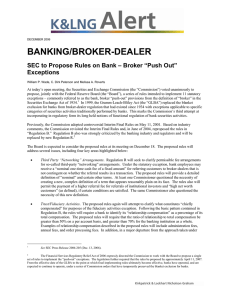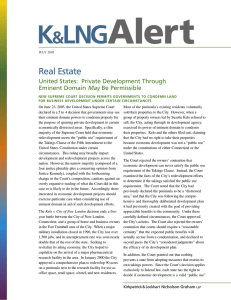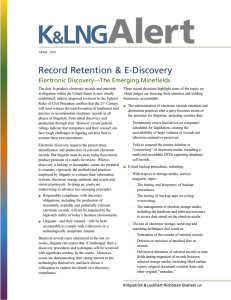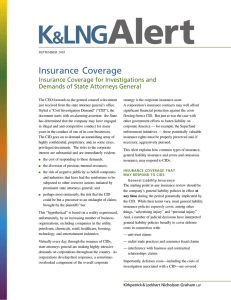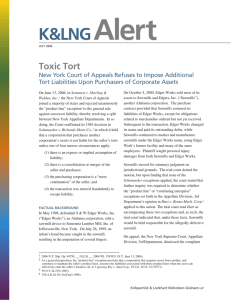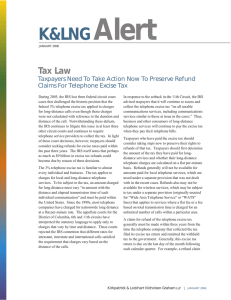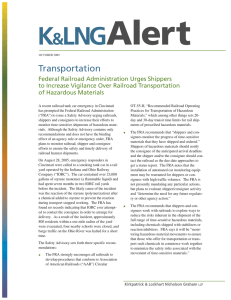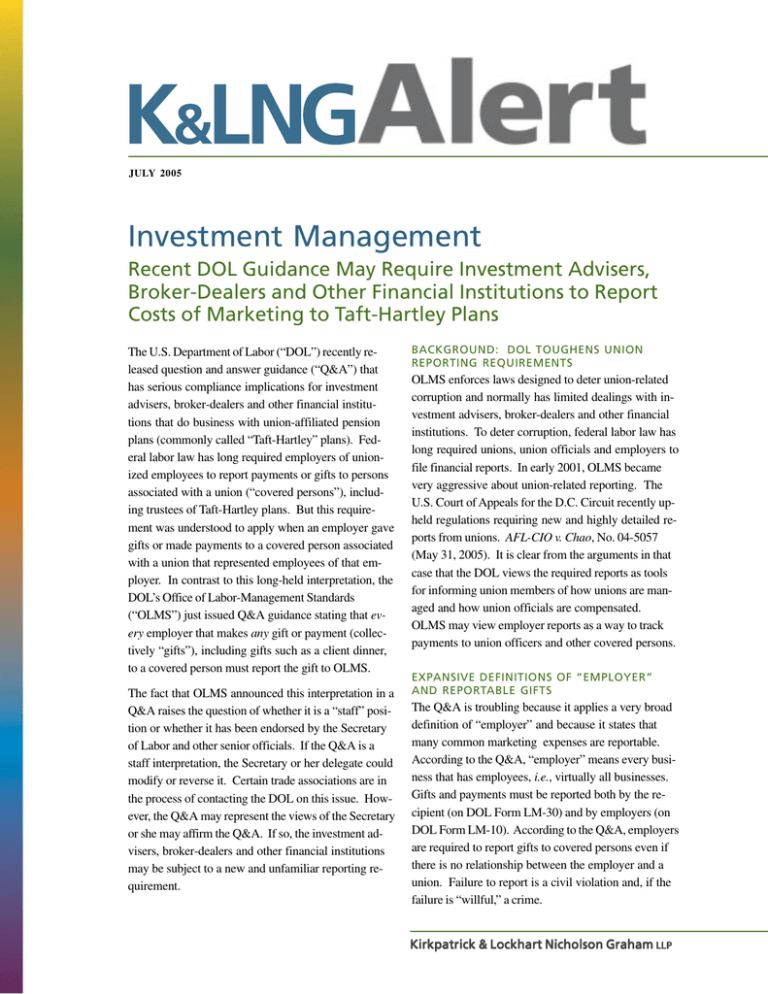
JULY 2005
Investment Management
Recent DOL Guidance May Require Investment Advisers,
Broker-Dealers and Other Financial Institutions to Report
Costs of Marketing to Taft-Hartley Plans
The U.S. Department of Labor (“DOL”) recently released question and answer guidance (“Q&A”) that
has serious compliance implications for investment
advisers, broker-dealers and other financial institutions that do business with union-affiliated pension
plans (commonly called “Taft-Hartley” plans). Federal labor law has long required employers of unionized employees to report payments or gifts to persons
associated with a union (“covered persons”), including trustees of Taft-Hartley plans. But this requirement was understood to apply when an employer gave
gifts or made payments to a covered person associated
with a union that represented employees of that employer. In contrast to this long-held interpretation, the
DOL’s Office of Labor-Management Standards
(“OLMS”) just issued Q&A guidance stating that every employer that makes any gift or payment (collectively “gifts”), including gifts such as a client dinner,
to a covered person must report the gift to OLMS.
The fact that OLMS announced this interpretation in a
Q&A raises the question of whether it is a “staff” position or whether it has been endorsed by the Secretary
of Labor and other senior officials. If the Q&A is a
staff interpretation, the Secretary or her delegate could
modify or reverse it. Certain trade associations are in
the process of contacting the DOL on this issue. However, the Q&A may represent the views of the Secretary
or she may affirm the Q&A. If so, the investment advisers, broker-dealers and other financial institutions
may be subject to a new and unfamiliar reporting requirement.
BACKGROUND: DOL TOUGHENS UNION
REPORTING REQUIREMENTS
OLMS enforces laws designed to deter union-related
corruption and normally has limited dealings with investment advisers, broker-dealers and other financial
institutions. To deter corruption, federal labor law has
long required unions, union officials and employers to
file financial reports. In early 2001, OLMS became
very aggressive about union-related reporting. The
U.S. Court of Appeals for the D.C. Circuit recently upheld regulations requiring new and highly detailed reports from unions. AFL-CIO v. Chao, No. 04-5057
(May 31, 2005). It is clear from the arguments in that
case that the DOL views the required reports as tools
for informing union members of how unions are managed and how union officials are compensated.
OLMS may view employer reports as a way to track
payments to union officers and other covered persons.
EXPANSIVE DEFINITIONS OF “EMPLOYER”
AND REPORTABLE GIFTS
The Q&A is troubling because it applies a very broad
definition of “employer” and because it states that
many common marketing expenses are reportable.
According to the Q&A, “employer” means every business that has employees, i.e., virtually all businesses.
Gifts and payments must be reported both by the recipient (on DOL Form LM-30) and by employers (on
DOL Form LM-10). According to the Q&A, employers
are required to report gifts to covered persons even if
there is no relationship between the employer and a
union. Failure to report is a civil violation and, if the
failure is “willful,” a crime.
Kirkpatrick & Lockhart Nicholson Graham LLP
Reportable gifts include many items that are routinely
offered to clients and prospective clients. The Q&A
specifically lists dinners, golf outings, tickets to baseball games and invitations to holiday parties as reportable “gifts.” Indeed, it states that all gifts and
payments must be reported unless “they (1) have a
value of $25 or less, (2) are sporadic or occasional,
and (3) are given under circumstances unrelated to
the recipient’s status in a labor organization.” Although the law provides that certain payments need
not be disclosed, the statutory exemption does not
clearly apply to normal marketing expenses. The full
Q&A can be found at http://www.dol.gov/esa/regs/
compliance/olms/LM30_LM10_Trusts_Info.htm.
$10,000 or both. A related labor law makes any payments by an “employer” to a union officer or employee with the intent to influence that person in his
duties a crime punishable by up to five years in prison
and a $15,000 fine. If this law is interpreted in the
same fashion as the Q&A interprets the LM-10 reporting requirement, mere payment of normal marketing
expenses may be treated as a crime if the recipient is a
covered person and the event is perceived as intending to influence the person. Although the language of
the two statutes is not identical, the differences in language may not be sufficient to keep payment of the
marketing expenses at issue from being characterized
as criminal conduct.
REPORTING DEADLINES
CONCLUSION
Normally, employer reports on DOL Form LM-10
must be filed not later than 90 days after the end of
the employer’s fiscal year. It is unclear whether
OLMS will try to require reports for past periods or
only for periods beginning in 2005. OLMS announced a grace period ending July 15, 2005, for
LM-30 filers (i.e., recipients of gifts) and suggested informally that there may be a grace period for LM-10
filers. But a grace period will only delay the reporting deadline and may not offer retroactive relief. In
any event, OLMS has not made any public announcement about grace periods for employers.
The Q&A represents a sweeping expansion of how the
employer reporting requirement has been interpreted
and applied. The DOL undoubtedly will hear from affected sectors of the business community and may revise or abandon the view that every employer must report every payment to a covered person.
IMPLICATIONS OF THE DOL Q&A
The new Q&A is troubling for several reasons. If the
Secretary or senior DOL officials support the literal
language of the Q&A, financial institutions that engage in normal marketing to union trustees or other
officials of Taft-Hartley plans—such as taking the
trustee to dinner or a baseball game—will be required
to report marketing expenses. This rule applies regardless of amount—even a gift worth less than $25
must be reported if it was made because of the
recipient’s relationship with a union. Arguably, every
marketing expense that involves a union-appointed
trustee of a Taft-Hartley plan has such a relationship—the desire to attract and retain union-associated
benefit plans as clients.
More ominous are the criminal law implications. An
employer’s “willful failure” to report gifts is a crime,
punishable by one year in prison, a fine of up to
2 JULY 2005
Even if the DOL does change its views on the scope of
employer reporting on Form LM-10, it may not
change its views on what covered persons are required
to report on Form LM-30. That is, covered persons
may still have to report gifts that they receive from financial institutions. Taft-Hartley plans may try to address the issue by asking financial institutions to provide reporting information (e.g., the value of a dinner)
or may bar trustees and other covered persons from receiving such gifts altogether.
If you have any current or prospective clients that are
Taft-Hartley plans, we encourage you to be aware of
the issues raised by the Q&A and, as appropriate, discuss them with representatives of your Taft-Hartley clients and your K&LNG relationship attorney. We will
keep you apprised of developments regarding this issue.
David E. Pickle
dpickle@klng.com
202.778.9887
William A. Schmidt
william.schmidt@klng.com
202.778.9373
Catherine S. Bardsley
cbardsley@klng.com
202.778.9289
William P. Wade
wwade@klng.com
310.552.5072
KIRKPATRICK & LOCKHART NICHOLSON GRAHAM LLP
Kirkpatrick & Lockhart Nicholson Graham has approximately 950 lawyers and represents entrepreneurs, growth and
middle market companies, capital markets participants, and leading FORTUNE 100 and FTSE 100 global corporations
nationally and internationally. Members of the Investment Management Practice Group and their telephone numbers and email addresses are listed below. For more information you may also visit our website at www.klng.com, or
send general inquiries via e-mail to investmentmanagement@klng.com.
WASHINGTON
BOSTON
Michael S. Caccese
Philip J. Fina
Mark P. Goshko
Thomas Hickey III
Nicholas S. Hodge
George Zornada
LONDON
Philip Morgan
617.261.3133
617.261.3156
617.261.3163
617.261.3208
617.261.3210
617.261.3231
mcaccese@klng.com
pfina@klng.com
mgoshko@klng.com
thickey@klng.com
nhodge@klng.com
gzornada@klng.com
+44.20.7360.8123
pmorgan@klng.com
LOS ANGELES
William P. Wade
310.552.5071
Clifford J. Alexander
Diane E. Ambler
Mark C. Amorosi
Catherine S. Bardsley
Arthur J. Brown
Arthur C. Delibert
Jennifer R. Gonzalez
Robert C. Hacker
Kathy Kresch Ingber
Michael J. King
Rebecca H. Laird
Deborah A. Linn
Cary J. Meer
R. Charles Miller
Dean E. Miller
Charles R. Mills
Jean E. Minarick
R. Darrell Mounts
C. Dirk Peterson
David Pickle
Alan C. Porter
Theodore L. Press
wwade@klng.com
NEW YORK
Robert J. Borzone, Jr. 212.536.4029
Jeffrey M. Cole
212.536.4823
Ricardo Hollingsworth 212.536.4859
Beth R. Kramer
212.536.4024
Richard D. Marshall
212.536.3941
Keith W. Miller
212.536.4045
Scott D. Newman
212.536.4054
rborzone@klng.com
jcole@klng.com
rhollingsworth@klng.com
bkramer@klng.com
rmarshall@klng.com
kmiller@klng.com
snewman@klng.com
SAN FRANCISCO
Eilleen M. Clavere
Jonathan D. Joseph
David Mishel
Timothy B. Parker
Mark D. Perlow
Richard M. Phillips
eclavere@klng.com
jjoseph@klng.com
dmishel@klng.com
tparker@klng.com
mperlow@klng.com
rphillips@klng.com
415.249.1047
415.249.1012
415.249.1015
415.249.1042
415.249.1070
415.249.1010
202.778.9068
202.778.9886
202.778.9351
202.778.9289
202.778.9046
202.778.9042
202.778.9286
202.778.9016
202.778.9015
202.778.9214
202.778.9038
202.778.9874
202.778.9107
202.778.9372
202.778.9371
202.778.9096
202.778.9029
202.778.9298
202.778.9324
202.778.9887
202.778.9186
202.778.9025
Francine J. Rosenberger 202.778.9187
Robert H. Rosenblum 202.778.9464
William A. Schmidt
202.778.9373
Lori L. Schneider
202.778.9305
Lynn A. Schweinfurth 202.778.9876
Donald W. Smith
202.778.9079
Martin D. Teckler
202.778.9890
Robert A. Wittie
202.778.9066
Robert J. Zutz
202.778.9059
calexander@klng.com
dambler@klng.com
mamorosi@klng.com
cbardsley@klng.com
abrown@klng.com
adelibert@klng.com
jgonzalez@klng.com
rhacker@klng.com
kingber@klng.com
mking@klng.com
rlaird@klng.com
dlinn@klng.com
cmeer@klng.com
cmiller@klng.com
dmiller@klng.com
cmills@klng.com
jminarick@klng.com
dmounts@klng.com
dpeterson@klng.com
dpickle@klng.com
aporter@klng.com
tpress@klng.com
francine.rosenberger@klng.com
rrosenblum@klng.com
william.schmidt@klng.com
lschneider@klng.com
lschweinfurth@klng.com
dsmith@klng.com
mteckler@klng.com
rwittie@klng.com
rzutz@klng.com
www
.klng.com
www.klng.com
BOSTON
■
DALLAS
■
HARRISBURG
■
LONDON
■
LOS ANGELES
■
MIAMI
■
NEWARK
■
NEW YORK
■
PALO ALTO
■
PITTSBURGH
■
SAN FRANCISCO
■
WASHINGTON
Kirkpatrick & Lockhart Nicholson Graham (K&LNG) has approximately 950 lawyers and represents entrepreneurs, growth and middle market companies, capital markets
participants, and leading FORTUNE 100 and FTSE 100 global corporations nationally and internationally.
K&LNG is a combination of two limited liability partnerships, each named Kirkpatrick & Lockhart Nicholson Graham LLP, one qualified in Delaware, U.S.A. and practicing
from offices in Boston, Dallas, Harrisburg, Los Angeles, Miami, Newark, New York, Palo Alto, Pittsburgh, San Francisco and Washington and one incorporated in England
practicing from the London office.
This publication/newsletter is for informational purposes and does not contain or convey legal advice. The information herein should not be used or relied upon in
regard to any particular facts or circumstances without first consulting a lawyer.
Data Protection Act 1988—We may contact you from time to time with information on Kirkpatrick & Lockhart Nicholson Graham LLP seminars and with our regular
newsletters, which may be of interest to you. We will not provide your details to any third parties. Please e-mail cgregory@klng.com if you would prefer not to receive
this information.
© 2005 KIRKPATRICK & LOCKHART NICHOLSON GRAHAM LLP. ALL RIGHTS RESERVED.



